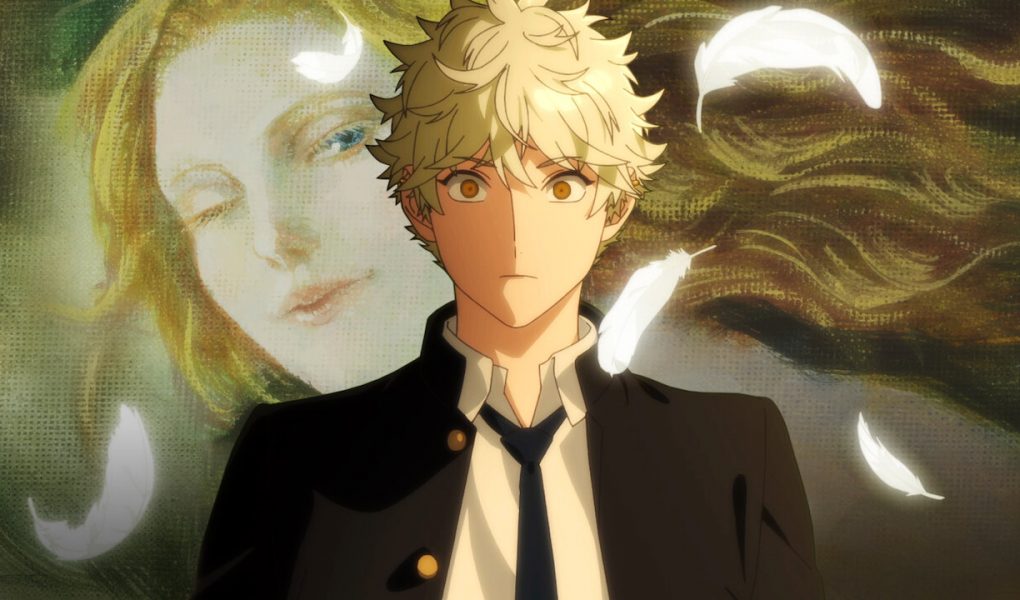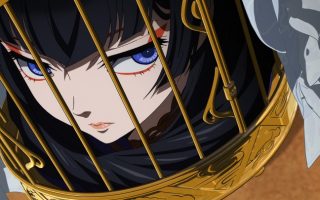





 You don’t get the chance to throw the term around all that often when it comes to anime, but Blue Period is deep. Very, very deep. There’s a lot going on here, on so many levels. It’s demanding in the sense that if you want to appreciate it on the level it aspires to, you really have to take time and seriously process what you’re seeing. But it has such a natural flow to it that it’s easy to get swept up in the narrative. It’s like a current pulling you along the surface of the water, when there are interesting things barely visible in the depths below you.
You don’t get the chance to throw the term around all that often when it comes to anime, but Blue Period is deep. Very, very deep. There’s a lot going on here, on so many levels. It’s demanding in the sense that if you want to appreciate it on the level it aspires to, you really have to take time and seriously process what you’re seeing. But it has such a natural flow to it that it’s easy to get swept up in the narrative. It’s like a current pulling you along the surface of the water, when there are interesting things barely visible in the depths below you.
 I feel like Blue Period really speaks with authority on the subjects closest to its center. It really seems to grasp being a kid, being a mentor, and being an aspiring artist. I have to take the third one on faith to an extent since I’m not blessed with that sort of insight, but the mangaka graduated from Tokyo University of the Arts herself so I think it’s a pretty safe bet. But I have been a kid, and I have been a teacher. And this series speaks to my experience in an extremely personal and authentic way.
I feel like Blue Period really speaks with authority on the subjects closest to its center. It really seems to grasp being a kid, being a mentor, and being an aspiring artist. I have to take the third one on faith to an extent since I’m not blessed with that sort of insight, but the mangaka graduated from Tokyo University of the Arts herself so I think it’s a pretty safe bet. But I have been a kid, and I have been a teacher. And this series speaks to my experience in an extremely personal and authentic way.
 When the series really goes under the hood where art is concerned (as it does often) it’s basically an education for me. The concept of art being driven by basic shapes may be implicit to those who understand art, but when I see a face or a flower field on canvas I see a face or a flower field. I like the idea that Yaguchi (does anyone ever look at him and just for a second think “high school Killua”?) can learn much from doing replicas – that replicas are in fact more than just replicas. And the unease he and the other high schoolers feel when they switch to the morning class and are suddenly amidst adults feels very elemental and real.
When the series really goes under the hood where art is concerned (as it does often) it’s basically an education for me. The concept of art being driven by basic shapes may be implicit to those who understand art, but when I see a face or a flower field on canvas I see a face or a flower field. I like the idea that Yaguchi (does anyone ever look at him and just for a second think “high school Killua”?) can learn much from doing replicas – that replicas are in fact more than just replicas. And the unease he and the other high schoolers feel when they switch to the morning class and are suddenly amidst adults feels very elemental and real.
 Maybe artists know about stuff like girls into art being big eaters and boys light eaters – I don’t know. I’m sure they know about “exam art”, because this is Japan first of all, but also because that’s something common in every field, and which I have personal experience with. Having some experience with the Japanese educational system as well, I can vouch that (especially where English is concerned) to an extent the whole thing is geared around teaching students how to pass tests. Cram schools (“juku”) especially – that’s basically their entire reason for existing. An understanding of the subject or its application in the real world is irrelevant – just learn how to game the exams.
Maybe artists know about stuff like girls into art being big eaters and boys light eaters – I don’t know. I’m sure they know about “exam art”, because this is Japan first of all, but also because that’s something common in every field, and which I have personal experience with. Having some experience with the Japanese educational system as well, I can vouch that (especially where English is concerned) to an extent the whole thing is geared around teaching students how to pass tests. Cram schools (“juku”) especially – that’s basically their entire reason for existing. An understanding of the subject or its application in the real world is irrelevant – just learn how to game the exams.
 I find Yotasuke-kun – and his relationship with Yaguchi – to be especially interesting. This is a boy with real talent but not as much as he yearns to have, and frustration that the world stubbornly refuses to play by his rules. To him Yaguchi’s world seems limitless, and his own confined by expectations. He’s the one who clues Yaguchi in about exam art, and eventually (notably, after Yaguchi places higher than he – or Haruka – in the competition) quits cram school altogether. In that competition it’s the prodigy Kuwana-san (Miyamoto Yume) who places first, but she’s not happy about it – apparently there’s a curse that whoever wins inevitably fails the entrance exam.
I find Yotasuke-kun – and his relationship with Yaguchi – to be especially interesting. This is a boy with real talent but not as much as he yearns to have, and frustration that the world stubbornly refuses to play by his rules. To him Yaguchi’s world seems limitless, and his own confined by expectations. He’s the one who clues Yaguchi in about exam art, and eventually (notably, after Yaguchi places higher than he – or Haruka – in the competition) quits cram school altogether. In that competition it’s the prodigy Kuwana-san (Miyamoto Yume) who places first, but she’s not happy about it – apparently there’s a curse that whoever wins inevitably fails the entrance exam.
 Ooba-sensei really comes into her own this week, and I love the fact that the teacher characters here are so well-drawn. Ooba can sense the potential in Yaguchi, but also the frustration. In many ways kids like him are the most exciting students – the proverbial ball of unformed clay which could be molded into any shape. Ooba-sensei tells the boy that exam art has become a myth, but that this has in fact made getting into schools like Geidai that much harder. He wants shortcuts, she can’t offer them – and with art, she can’t teach him a formula or a theorem that he just has to memorize. I can sense both their frustrations in this scene intimately, but also their excitement about what the undiscovered country may hold for Yaguchi.
Ooba-sensei really comes into her own this week, and I love the fact that the teacher characters here are so well-drawn. Ooba can sense the potential in Yaguchi, but also the frustration. In many ways kids like him are the most exciting students – the proverbial ball of unformed clay which could be molded into any shape. Ooba-sensei tells the boy that exam art has become a myth, but that this has in fact made getting into schools like Geidai that much harder. He wants shortcuts, she can’t offer them – and with art, she can’t teach him a formula or a theorem that he just has to memorize. I can sense both their frustrations in this scene intimately, but also their excitement about what the undiscovered country may hold for Yaguchi.
 It’s the other sensei, Saeki, who senses the frustration in Yaguchi and suggests he visit the Geidai culture festival to get an idea of what sort of artists attend there. I love the fact that Yaguchi turns to his old muggle buddies here – I totally get it. They’re his comfort zone, his support – a reminder of times when his life was simpler. But a chance (though quite logical) meeting with Yotasuke-kun (and his mother) at the festival raises the emotional bar. Yaguchi wants this boy to be his friend – partly because he’s a nice kid, and partly because he seeks his validation as an artist. Yotasuke says the most hurtful thing he can – he expresses his resentment that Yaguchi is trying to come over to “this side”, because he already has everything. For someone working as hard as Yaguchi is, this is a low blow.
It’s the other sensei, Saeki, who senses the frustration in Yaguchi and suggests he visit the Geidai culture festival to get an idea of what sort of artists attend there. I love the fact that Yaguchi turns to his old muggle buddies here – I totally get it. They’re his comfort zone, his support – a reminder of times when his life was simpler. But a chance (though quite logical) meeting with Yotasuke-kun (and his mother) at the festival raises the emotional bar. Yaguchi wants this boy to be his friend – partly because he’s a nice kid, and partly because he seeks his validation as an artist. Yotasuke says the most hurtful thing he can – he expresses his resentment that Yaguchi is trying to come over to “this side”, because he already has everything. For someone working as hard as Yaguchi is, this is a low blow.
 Adolescent dynamics are so fascinating, and yes, “teaching is hard”. I so get that, all of it. For someone who’s been immersed in the cliquish and somewhat socially outcast world of “art kids”, Yaguchi represents a hated normie. But for him this is not a choice, but a compulsion – there are easier paths he could choose, but none would be true to the person he is (extrapolate this to other situations or not, that’s up to you). The desire to express one’s soul, once awakened, can never be extinguished – only suppressed at cost. It’s hard to think of a much better theme for a series, and Blue Period is the proof of that.
Adolescent dynamics are so fascinating, and yes, “teaching is hard”. I so get that, all of it. For someone who’s been immersed in the cliquish and somewhat socially outcast world of “art kids”, Yaguchi represents a hated normie. But for him this is not a choice, but a compulsion – there are easier paths he could choose, but none would be true to the person he is (extrapolate this to other situations or not, that’s up to you). The desire to express one’s soul, once awakened, can never be extinguished – only suppressed at cost. It’s hard to think of a much better theme for a series, and Blue Period is the proof of that.

































![]()
![]()
![]()
![]()
![]()
![]()
The post Blue Period – 04 appeared first on Lost in Anime.



